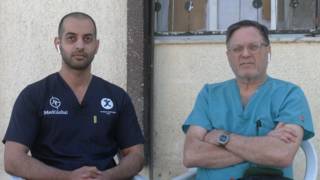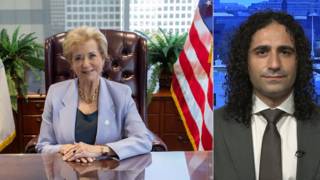HeadlinesNovember 06, 2007
Thousands Arrested in Pakistan Protest Crackdown
In Pakistan, a massive show of protest to President General Pervez Musharraf was met with force yesterday in the third day of emergency rule. Thousands of lawyers, human rights activists and journalists were tear-gassed, beaten and arrested for protesting what they describe as nothing short of martial law. At least 2,000 people have been arrested, but the actual number is believed to be far higher. Over 48 hours after the crisis erupted, President Bush made his first public comments following a White House meeting with Turkish Prime Minister Tayyip Erdogan. Bush urged Musharraf to hold elections but stressed his importance as a key ally in the so-called war on terror.
President Bush: “I asked the secretary to call him to convey this message: that we expect there to be elections as soon as possible and that the president should remove his military uniform. Previous to his decision, we made it clear that these emergency measures would undermine democracy. Having said that, I did remind the prime minister that President Musharraf has been a strong fighter against extremists and radicals.”
Pakistan has received over $10.5 billion in U.S. aid since 2001. Three-quarters of that funding goes to the military. In Britain, opposition leader Shahbaz Sharif denounced Western support for Musharraf.
Shahbaz Sharif: “They have said they have been deeply disappointed; however, they have not gone beyond that. I think what we expect from them is to ensure that if this law is not rolled back, if the judiciary is not restored back as of 2nd of November, 2007, and if Musharraf does not step back, and if free and fair elections, as has been the topic of all over, is not ensured, then they must not — then they must cease to support him.”
Earlier on Monday, General Musharraf claimed his crackdown would in fact lead to a speedier transition to democratic elections.
Gen. Pervez Musharraf: “I am fully determined to execute the third stage of transition that I’ve been talking of. First stage being myself being in charge from ’99 to 2002. The second stage, my indirect control and overseeing from 2002 to 2007. And now, a totally civilian president and fresh elections. This was the future that I saw.”
Demonstrations are continuing in Pakistan today. Deposed Chief Justice Iftikhar Muhammad Chaudhry has called for mass defiance of Musharraf’s crackdown. More on Pakistan later in the broadcast.
Bush Promises Intel Sharing on Kurds with Turkey
Back at the White House, President Bush emerged from his meeting with Turkish Prime Minister Tayyip Erdogan with a pledge to provide intelligence over Kurdish movements in northern Iraq.
President Bush: “We had a long discussion about a common concern. And that concern is the PKK. The PKK is a terrorist organization. They’re an enemy of Turkey, they’re an enemy of Iraq, and they’re an enemy of the United States.”
Analysts say a full-scale Turkish invasion of northern Iraq is unlikely, but that President Bush has effectively given his tacit approval for limited Turkish bombings of Kurdish rebel positions there.
Senate Judiciary Committee Set to Approve Mukasey
The Senate Judiciary Committee is set to vote today on whether to send the nomination of attorney general hopeful Michael Mukasey to the Senate floor. Mukasey’s confirmation was in doubt last week over his refusal to declare waterboarding a form of torture. But several Democratic senators have since claimed they’ll support his nomination.
Activists Stage Waterboarding Outside Justice Dept.
On the eve of the vote, activists with the group World Can’t Wait gathered in front of the Justice Department Monday to demonstrate an actual waterboarding. Twenty-six-year-old Iranian-American Maboud Ebrahimzadeh volunteered as the mock terror suspect. Activists posing as interrogators poured several quarts of water into his mouth while a cloth was placed over his face. He was in visible pain as the waterboarding proceeded.
Maboud Ebrahimzadeh: “This is easily the most terrifying experience I’ve ever had, ever felt. And although it’s a controlled environment, when water goes into your lungs, and you want to scream and you can’t, because you know as soon as you do, you’re going to choke.”
After the demonstration, anti-torture activist Clark Kissinger said waterboarding should only be seen as a form of torture.
Clark Kissinger: “Today we wanted to put on an actual demonstration of what waterboarding means when it’s conducted by this government to people around the world. There seems to have been some confusion in the media about this. Some people like to refer to it as an 'enhanced interrogation technique.' It is not an enhanced interrogation technique. It is torture.”
Meanwhile, 24 former U.S. intelligence officials are urging Senate Judiciary members not to back Mukasey’s nomination until he declares his position on waterboarding. In a letter released Monday, the ex-officials wrote: “We are aware that the president warned last week that it will be either Mukasey as our attorney general or no one. So be it.”
Displaced Iraqis Quadruple Since U.S. Surge
In Iraq, new figures show the number of displaced Iraqis has quadrupled under the so-called U.S. troop surge that began earlier this year. According to the Iraqi Red Crescent, 2.3 million people have been forced to flee their homes. Eight in 10 were residents of Baghdad.
Israel: Peace Talks at End of Month
In Israel and the Occupied Territories, Israeli Prime Minister Ehud Olmert has announced a long-planned U.S.-backed peace conference will be held the last week of this month. The Bush administration had previously refused to give a date for the meeting. Speaking in Ramallah, Secretary of State Condoleezza Rice said she hoped the talks would lead to a final peace deal.
Secretary of State Condoleezza Rice: “This is indeed an historic time. It’s a time of real opportunity. And I look forward to working with you over the next period of time so that we might prepare for a successful meeting at Annapolis, which should be the launching pad then for the negotiations that we have long sought, negotiations that I sincerely hope, as prime minister said — Prime Minister Olmert said last night, could achieve their goal within the time remaining to the Bush administration.”
U.S. and Israeli officials say they hope to resolve all remaining final status issues but have been vague on the details. Israel has already rejected an Arab League peace offer that would provide full peace in return for a full withdrawal from the Occupied Territories.
Record Number of Detainees in U.S. Immigration Jails
Back in the United States, new figures show a record number of detainees are being held in U.S. immigration jails. The immigrant jail population has now topped 30,000, up from less than 20,000 last year. Four thousand are being held in California. The rise is attributed to growing decline to the policy of so-called “catch and release.” Private companies involved in holding and transferring prisoners are seeing record contracts. Deportations are also on the rise, at 260,000 this year, up nearly 100,000 over two years ago. Immigrant rights advocates say the policy is leading to overcrowding and diminished medical care at the jails.
Contractor Guilty in Bribery Trial
In California, a contractor involved in the scandal that sent former Congressmember “Randy Duke” to jail has been found guilty on all 13 counts in his corruption trial. Brent Wilkes received more than $80 million in government contracts after bribing Cunningham with hundreds of thousands of dollars in cash and gifts. Wilkes faces up to 26 in prison. He still has to stand trial in a second case involving bribes to former CIA Executive Director Kyle “Dusty” Foggo.
Anti-Voter Caging Bill Introduced
And Democratic Senator Sheldon Whitehouse of Rhode Island has introduced a Senate bill that would outlaw voter caging. “Caging” is an election suppression tactic that seeks to bar voters by challenging their eligibility to vote. Republicans have been accused of maintaining caging lists skewed toward people of color, predominantly African Americans. The Caging Prohibition Act would prohibit challenges to a person’s eligibility based solely on returned mail or a caging list. The bill would also penalize anyone who challenges another voter’s eligibility without sufficient evidence.
Most popular
- 1
- 2
- 3
- 4
Non-commercial news needs your support
Please do your part today.











Media Options